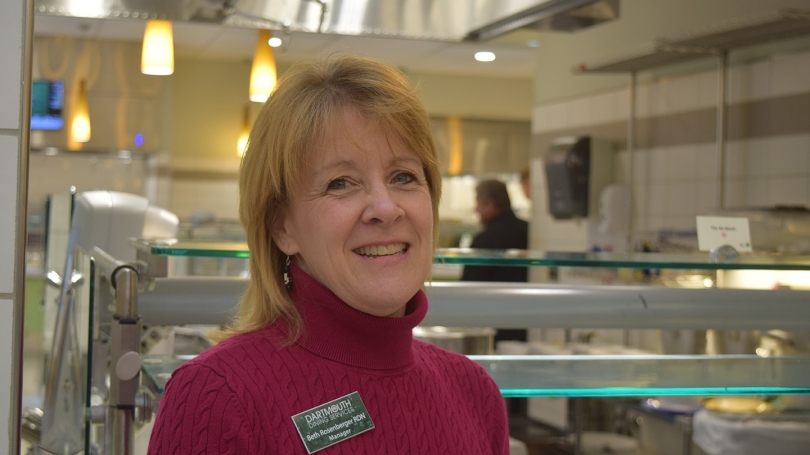
- About
- Departments & Services
- Projects
- Construction in Progress
- Service Requests
- News & Communications
Back to Top Nav
Back to Top Nav
Back to Top Nav
It’s true – life as a Dartmouth student can be crazy busy! Given the myriad demands on your time – to attend classes and study, to socialize, exercise, and oh yea, catch a few hours of sleep – there is often not a lot of time to fuel your body with nutritious, well-balanced meals. And for many students, there are food-related complexities to consider – allergies, dietary restrictions, stress-related binges or schedule-related limitations that make dining more of a “grab and run” experience.
This is life. And Dartmouth Dining does all it can to accommodate students’ everyday challenges to eat well, whenever and wherever they can. One of the most valuable resources available to students is Beth Rosenberger, Dartmouth’s dietitian. She is creative, smart, and dedicated, and she offers a free, confidential counseling service to guests who are enrolled in a Dining meal plan. She ensures meal plan holders have options to meet their particular nutritional needs throughout Dartmouth’s various dining venues. If invited, she also meets with concerned parents and prospective students to discuss meal options that avoid certain allergens.
A registered dietitian with a BS in nutrition, and years of experience working in health care, public school and restaurant settings, Beth collaborates with DDS chefs on menu development. Together they developed a gluten-free section for the 70+ students who exclusively choose gluten-free offerings. She is committed to ensuring nutritional information is accessible by putting every ingredient into the menu management system, and tagging recipes that have certain allergens.
Beth also conducts training for DDS staff, who must recognize that students often advocate for themselves in subtle ways. When a student asks about a particular ingredient, are they really trying to address a food allergy? With over 175 different types of food that can cause food allergies, many of which are life threatening, it is important to know the difference between food allergies and food intolerance.
With today’s myriad health-related food problems and busy lives, Beth’s work with students has been well received. A parent recently wrote, “Thank you, Beth, for helping my daughter with the process of obtaining a meal for her weekend away varsity games. With the addition of soy and barley to her many food allergies, eating away from Dartmouth or home has become challenging. You have been such a great help to her over the last couple of years, and I appreciate it very much.”
Just think about what Beth can do to help you, and be in touch. Beth can be reached in the lower level of ’53 Commons or at Elizabeth.A.Rosenberger@Dartmouth.EDU.